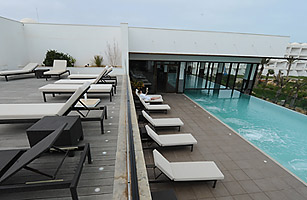
This post is in partnership with Worldcrunch, a new global news site that translates stories of note in foreign languages into English. The article below was originally published in La Stampa .
The Tunisian island of Djerba has for all intents and purposes become a Libyan colony. Since the beginning of the civil war, almost 50,000 Libyans have escaped to Tunisia, and 5,000 of them have flocked to Djerba, a popular tourist destination before the wave of revolts began sweeping through North Africa.
Here, the rifts of the civil war are evident. On the island, Muammar Gaddafi’s supporters and rebels live dangerously side by side. Spies of the regime pretend to be refugees, while revolutionaries dress up as businessmen. It is a melting pot of rumors, provocations, deep misery and outrageous luxury. The enemies have something in common, though. They are all stuck, waiting to know what will happen to Gaddafi. They all watch al-Jazeera, looking for clues about when and if he will fall.
The “five-star refugees” rule Djerba’s cafs and nightclubs, which they treat as their own. Djerba is a sort of Florida for rich Libyans. Until three months ago, they used to go there every weekend. Many Libyan men used to find their dolce vita in Djerba’s luxury hotels, restaurants, casinos and nightclubs. The hypocritical Gaddafi regime frowned upon overtly public nightlife.
Now the rich Libyans are back on Djerba. They sit lazily at the bars. They block the streets with their white luxury cars. Even the airport’s parking lot is full of the cars of businessmen who are away in the Middle East and Europe.
“Top oil men and traffickers who were close to the regime have fled Libya with their money. They have found a safe place for their families, and now they are regaining control of their businesses,” says Farhat Tanfous, the mayor of Midoun, a town on the island.
It is both a blessing and a curse for Djerba. Due to the war, bookings by Europeans have dropped by half. The millionaire refugees have picked up the slack, occupying the island’s luxury hotels and villas. The beautiful houses hidden between the olive trees are sold out.
Many of them are open supporters of Gaddafi. Two large men sitting at the restaurant El Maluf and staring at the girls on the street are among them. “Why are we here? Because NATO is killing people in Tripoli. That’s why! Libya was a paradise before the arrival of these murderers from Cyrenaica who dope themselves before the fight. Watch Libyan television to see the truth! Even in Benghazi the majority of people support Gaddafi, but they cannot protest,” they say. The men refuse to identify themselves other than to say they are oil engineers.
Among Djerba’s Libyans, there are many agents of the political police, Kataeb el Amn. They disguise themselves as refugees in order to monitor the rebels on the island. They spread rumors that Libyan women are forced to prostitute themselves to feed their children. They try to split Libyans and Tunisians. They swear that Gaddafi will forgive everyone. They smile and they threaten. Fear is spreading among the poor refugees who are afraid to be captured by Gaddafi and his police.
Some of Djerba’s refugees just sit in the middle. They wait in front of the television to see who will win. They’re eager to know when they will be able to get back to business and take advantage of their tribal relations, which will be even more useful in the future than under Gaddafi’s regime.
Finally, there are the other refugees, the poor ones, still bewildered and shocked by the bombings. Many of them haven’t made it to Djerba. Instead they are stuck in Tunisian villages close to the border with Libya. Only Tunisian generosity is saving them. Tunisians have opened their houses and stadiums to the Libyan refugees. They are even organizing classes for the children.
In the end, that is what’s keeping these refugees going: Tunisian solidarity and compassion. “With all our oil, we would have never been able to do all this,” said Ala, a Libyan refugee. These words express the final damnation of a 40-year regime.
Also from Worldcrunch:
In France, Barbers Are Back— Les Echos
In Poland, Shale Gas Fuels Dreams of Energy Independence—Le Monde
The Dalai Lama’s Successor Speaks Out — Le Temps
See a video of Somali refugees from Libya putting on a show in Tunisia.
Read about Gaddafi’s nepotism in the “Top 10 Abuses of Power.”